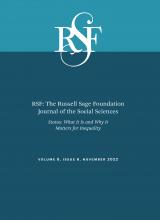Research Article
Open Access
Status, Symbols, and Politics: A Theory of Symbolic Status Politics
Tali Mendelberg
RSF: The Russell Sage Foundation Journal of the Social Sciences November 2022, 8 (6) 50-68; DOI: https://doi.org/10.7758/RSF.2022.8.6.03
Tali Mendelberg
aJohn Work Garrett Professor of Politics at Princeton University and director of the Program on Inequality at the Mamdouha S. Bobst Center for Peace and Justice, United States

REFERENCES
- ↵
- Abrajano, Marisa, and
- Zoltan L. Hajnal
- ↵
- Acharya, Avidit,
- Matthew Blackwell, and
- Maya Sen
- ↵
- Armstrong, Elizabeth A., and
- Laura T. Hamilton
- ↵
- Baldwin, Kate, and
- John D. Huber
- ↵
- Blumer, Herbert
- ↵
- Bobo, Lawrence
- ↵
- Bobo, Lawrence, and
- Vincent L. Hutchings
- ↵
- Brader, Ted,
- Nicholas A. Valentino, and
- Elizabeth Suhay
- ↵
- Brewer, Marilynn B
- ↵
- Brown, Gordon D. A.,
- Jonathan Gardner,
- Andrew J. Oswald, and
- Jing Qian
- ↵
- ↵
- Chandra, Kanchan
- ↵
- Chauchard, Simon
- ↵
- Choi, Donghyun Danny,
- Mathias Poertner, and
- Nicholas Sambanis
- ↵
- Chwe, Michael Suk-Young
- ↵
- Citrin, Jack, and
- Donald P. Green
- ↵
- Citrin, Jack,
- Donald P. Green,
- Christopher Muste, and
- Cara Wong
- ↵
- Citrin, Jack,
- Beth Reingold, and
- Donald P. Green
- ↵
- Cohen, Cathy J
- ↵
- Craig, Maureen A., and
- Jennifer A. Richeson
- ↵
- ↵
- Cramer, Katherine J
- ↵
- DiMaggio, Paul
- ↵
- Duckitt, John
- ↵
- Dunning, Thad, and
- Janhavi Nilekani
- ↵
- Eagly, Alice H., and
- Shelly Chaiken
- ↵
- Easterly, William, and
- Ross Levine
- ↵
- Edelman, Murray
- ↵
- Fiske, Susan T
- ↵
- Frank, Robert H
- ↵
- Franko, William,
- Caroline J. Tolbert, and
- Christopher Witko
- ↵
- Fraser, Nancy,
- Axel Honneth, and
- Joel Golb
- ↵
- Gidron, Noam, and
- Peter A. Hall
- ↵
- ↵
- Gramsci, Antonio
- ↵
- ↵
- Gusfield, Joseph R
- ↵
- Habyarimana, James,
- Macartan Humphreys,
- Daniel N. Posner, and
- Jeremy M. Weinstein
- ↵
- ↵
- Hochschild, Jennifer
- ↵
- Hopkins, Daniel J
- ↵
- Horowitz, Donald L
- ↵
- ↵
- Huddy, Leonie
- ↵
- Karpowitz, Chris, and
- Tali Mendelberg
- ↵
- ↵
- Kenworthy, Lane, and
- Jonas Pontusson
- ↵
- Kerner Commission
- ↵
- Key, V. O
- ↵
- Kinder, Donald R., and
- Cindy D. Kam
- ↵
- Kinder, Donald, and
- Tali Mendelberg
- ↵
- Kinder, Donald, and
- David Sears
- ↵
- Kopstein, Jeffrey S., and
- Jason Wittenberg
- ↵
- Kraus, Michael,
- Paul K. Piff, and
- Dacher Keltner
- ↵
- Kraus, Michael,
- Michelle Rheinschmidt, and
- Paul Piff
- ↵
- ↵
- Lamont, Michele
- ↵
- Lieberman, Evan S
- ↵
- Luker, Kristin
- ↵
- Mansbridge, Jane
- ↵
- Markus, Hazel Rose, and
- Nicole M. Stephens
- ↵
- Masuoka, Natalie, and
- Jane Junn
- ↵
- McCall, Leslie
- ↵
- ↵
- McClendon, Gwyneth H
- ↵
- Mendelberg, Tali
- ↵
- Mendelberg, Tali,
- Katherine T. McCabe, and
- Adam Thal
- ↵
- Messick, David M., and
- Diane M. Mackie
- ↵
- Miller, Arthur H.,
- Patricia Gurin,
- Gerald Gurin, and
- Oksana Malanchuk
- ↵
- Mutz, Diana C
- ↵
- ↵
- ↵
- Petersen, Roger D
- ↵
- Petty, Richard, and
- John Cacioppo
- ↵
- Pharr, Susan
- ↵
- Posner, Daniel
- ↵
- Ridgeway, Cecilia L
- ↵
- Ridgeway, Cecilia L., and
- Shelley J. Correll
- ↵
- Ridgeway, Cecilia L., and
- Hazel Rose Markus
- ↵
- Rozenas, Arturas, and
- Anastasiia Vlasenko
- ↵
- Schildkraut, Deborah J
- ↵
- Sears, David O
- ↵
- Sears, David O
- ↵
- Sears, David O., and
- Carolyn L. Funk
- ↵
- Sears, David O.,
- Richard R. Lau,
- Tom R. Tyler, and
- Harris M. Allen
- ↵
- Sidanius, Jim, and
- Felicia Pratto
- ↵
- Smith, Richard H., and
- Charles E. Hoogland
- ↵
- Sniderman, Paul M.,
- Pierangelo Peri,
- Rui J. P. de Figueiredo, and
- Thomas Piazza
- ↵
- Spinner-Halev, Jeff, and
- Elizabeth Theiss-Morse
- ↵
- Staub, Ervin
- ↵
- Strack, Fritz, and
- Roland Deutsch
- ↵
- Tajfel, Henri
- ↵
- Tankard, Margaret E., and
- Elizabeth Levy Paluck
- ↵
- Thal, Adam
- ↵
- Veblen, Thorstein
- ↵
- Waldron, Jeremy
- ↵
- Weber, Max
In this issue
Status, Symbols, and Politics: A Theory of Symbolic Status Politics
Tali Mendelberg
RSF: The Russell Sage Foundation Journal of the Social Sciences Nov 2022, 8 (6) 50-68; DOI: 10.7758/RSF.2022.8.6.03
Jump to section
Related Articles
- No related articles found.
Cited By...
- No citing articles found.





